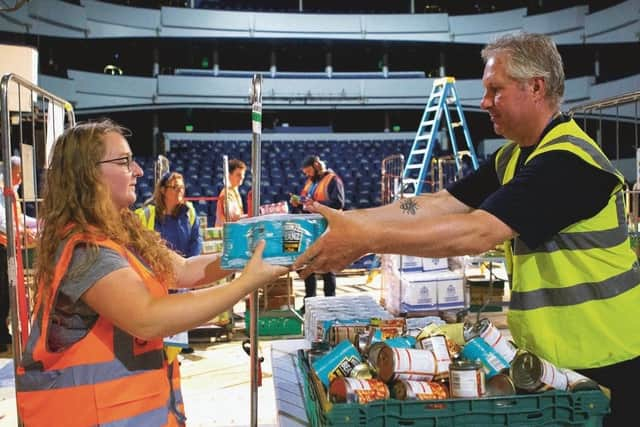Ones to watch in 2021: James Mackenzie-Blackman, artistic director


A few days after lockdown hit Scotland’s theatres, last March, James Mackenzie-Blackman, Chief Executive of Eden Court Theatre, went along to a Highland Council meeting armed with a carefully prepared presentation about the theatre’s financial plight. Box office receipts had fallen to zero, staff and building costs remained as high as ever; and like theatre bosses across a Covid-hit world, Mackenzie-Blackman had come to ask for urgent emergency funding.
Before he spoke, though, he found himself listening to the previous item of business, a detailed debate about the many emergency provisions the council would have to put in place in order to deal with the pandemic. By the time Mackenzie-Blackman’s turn to speak came round, he found himself offering help, rather than asking for it; and by 5pm that afternoon, he and the council leader were announcing a deal under which the council agreed to protect the jobs of the Eden Court workforce, in return for their willingness to help set up and staff a Covid helpline, provide volunteer and professional support for elderly people and nursery staff, and – most spectacularly, as captured a few weeks later in a historic picture by photographer Jane Barlow – transform the building into a distribution hub for food packages, heading out to vulnerable households across the Highlands.
Advertisement
Hide Ad“I suppose that throughout my career in publicly-funded arts companies,” says Mackenzie-Blackman, “I’ve always thought of myself, really, as a public servant. And when we were confronted with this crisis, it just seemed obvious that our job, if we couldn’t open as a theatre, was to see what else we could do, to help meet the needs of the whole community.”


In a year when the usual business of creating and staging live theatre has been put on hold, in other words, Mackenzie-Blackman has rapidly emerged as one of the leaders of Scotland’s theatre community, in taking the measure of this crisis and in beginning to develop the networks of new and reimagined relationships theatres will need, in order both to survive the pandemic and to thrive in its aftermath. Mackenzie-Blackman arrived at Eden Court early in 2018, after its long-standing Chief Executive Colin Marr took up a new role at the Edinburgh Playhouse; but his road to the top job at Scotland’s second biggest building-based theatre organisation (after Capital Theatres in Edinburgh) began in Devon, where he was born in 1980.
He describes his family as working class; his dad was ex-RAF, his mother worked in Marks & Spencer. For James and his brother and sister, though, encouragement to aim high and seize every opportunity was never in short supply; and although he experienced some bullying at school – he had realised he was gay when he was about 11 or 12 years old – he very rapidly “found his tribe” at Plymouth Theatre Royal’s Youth Theatre, where he soon realised that what appealed to him most was the role of company manager.
After school, and a degree at Liverpool University, he began a theatre career that has carried him seamlessly from Greenwich Theatre, through a successful six-year stint at the Lyric Hammersmith, to the UK National Youth Theatre, and finally to something of a dream job with Matthew Bourne’s New Adventures, one of the world’s leading international dance companies. “All of us at the top of that company had come from relatively humble backgrounds,” says Mackenzie-Blackman, “and sometimes we just used to hug ourselves, as we sat in some hugely sophisticated setting in LA or Sydney, and say, well, this was never meant to happen!”
By 2017, though, Mackenzie-Blackman and his husband, who comes from a Glasgow family, had adopted two young children; Mackenzie-Blackman decided to cut down on the travelling lifestyle, and a few days later saw the announcement of Colin Marr’s departure from Inverness. “I knew Eden Court,” says Mackenzie-Blackman. “I had visited it a couple of times while I was working with New Adventures, and I could see what a busy place it was from morning to night, with such a beautiful location, and such a fantastic breadth of programming. So I sent the news story to my husband, and he just said, “Get that job!”
Today, three years later, Mackenzie-Blackman and his husband are living with their two sons in the Black Isle, and fully enjoying Highland life; and last month, with Highland Region placed in Tier 1 of Scotland’s Covid restriction system, he was alone, among Scotland’s large-scale theatre bosses in being able to reopen his doors to the public for distanced cinema screenings, with some small-scale live performances scheduled for January. Meanwhile, over this Christmas period – and in a time when public mourning for the thousands lost to the Covid epidemic is remarkably rare – Mackenzie-Blackman also had the idea of commissioning Inverness-based stage designer Kenneth Macleod to create a beautiful Christmas tree installation in the theatre’s riverside grounds, featuring a light for each of the thousands of people who have died of Covid this year in Scotland; the tree has already become a place of memory and consolation, for some of those bereaved during the pandemic.
Advertisement
Hide Ad“I think for me, ever since I was a kid in Devon, it’s always been about people and community; and although people sometimes say I should go into politics, theatre is the mechanism I choose, to bring people together. I don’t know what I’ll do after Eden Court; but I think this is probably the best multi-arts venue job anywhere in Britain, so I’m unlikely to want to repeat this kind of work elsewhere.
“And meanwhile, I think the most optimistic thing in Scottish theatre, this year, is the emerging relationship between the eleven biggest producing and receiving theatres in Scotland, with the aim of producing our own touring material, and benefiting from its success. At the moment, when a great Scottish-made show like Sunshine On Leith has a national tour, it’s almost always organised by a London producer, and any profits from it go straight back there. We have to make sure that doesn’t happen again.
Advertisement
Hide Ad"Or let’s say,” says Mackenzie Blackman, showing a brief flash of the negotiating steel behind his unfailingly friendly manner, “that it won’t be happening again. Not on my watch; and not if I have anything to do with it.”
A message from the Editor:
Thank you for reading this story on our website. While I have your attention, I also have an important request to make of you.
The dramatic events of 2020 are having a major impact on many of our advertisers - and consequently the revenue we receive. We are now more reliant than ever on you taking out a digital subscription to support our journalism.
To subscribe to scotsman.com and enjoy unlimited access to Scottish news and information online and on our app, visit https://www.scotsman.com/subscriptions
Joy Yates, Editorial Director